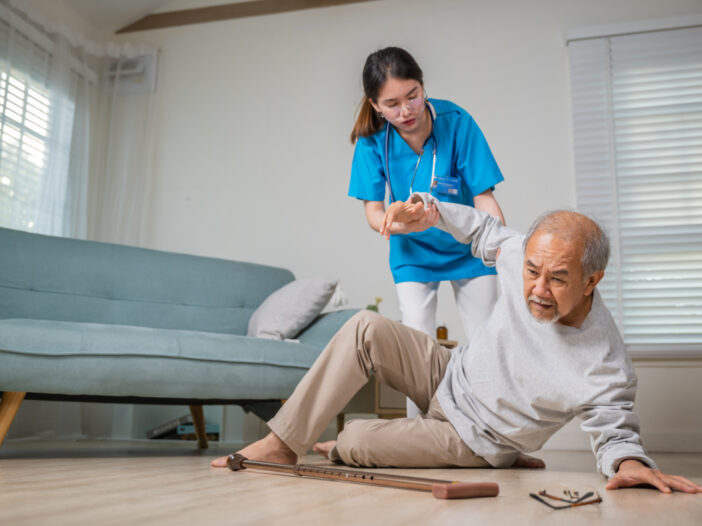
Falls in nursing homes are a significant concern for all parties involved. This type of nursing home injury can be extremely challenging to recover from for many residents. Understanding the reasons why the elderly may fall, plus understanding elderly fall statistics may help protect our elderly population. Knowing why the elderly sometimes die after a fall and implementing nursing home fall interventions is extremely important when attempting to avoid such incidents.
Factors Contributing to Nursing Home Falls
Negligent staff, living space hazards, and inadequate equipment can cause a nursing home fall. Serious accidents can even result in an elderly resident falling to their death. When attempting to avoid injury of any kind, taking a proactive approach is critical to limiting fall injuries and reducing nursing home deaths.
Staff Negligence
Many falls are a direct result of nursing home staff negligence, such as failure to follow established safety protocols. Staff negligence can lead to hazardous conditions that increase the risk of falling.
Living Space Hazards
Tripping hazards in a nursing home can also result in a fall. Common risks include cluttered walking spaces and poorly maintained facilities. Such areas need to be cleared and cleaned regularly to help limit nursing home falls.
Slippery Surfaces
Wet or slippery surfaces are common causes of falls. Regular maintenance to address spills and wet floors is most essential in preventing falls in nursing homes. A lack of attention being paid to the facility or to the patient may very well increase the risk of falling as well and lead to a nursing home fall lawsuit.
Inadequate Handrails
Handrails are necessary in nursing homes with proper installation and maintenance being vital for support and stability. Continuous evaluation of these facility tools is important to ensure that all areas are adequately equipped to assist residents in maintaining balance.
Insufficient Training
A lack of training can lead to improper handling of residents, potentially resulting in a fall. Ongoing training programs are crucial to keep staff updated on the best practices and techniques to use for fall prevention.
Lack of Supervision
Adequate supervision is a necessity to limit falls in nursing homes. A lack of supervision dramatically increases the chance of a resident falling to their death. Nursing home staff must closely monitor residents to minimize such risks.
Staff Shortages
Limited staff often leads to oversights and delayed assistance for nursing home residents, which increases the likelihood of a fall. Nursing homes must maintain adequate staffing levels to support and care for each and every resident.
Fall Prevention in Nursing Homes
Hazards in a nursing home can be wide-ranging, from misplaced objects to inadequate lighting. Implementing fall interventions in a nursing home is crucial to reduce these incidents and to create a safer environment.
Fall Prevention Protocols
Comprehensive fall prevention protocols are necessary to address the various risk factors in all facilities. Regular review of these protocols is vital to ensure that they remain adequate for the changing needs of the residents.
Environmental Modifications
Securing rugs and improving lighting can often reduce fall risks. These adjustments are often straightforward yet substantially reduce the chances of falls and should be taken seriously.
Individualized Mobility Assessments
Each resident of a nursing home is different and has unique needs and abilities. Individual mobility assessments are a fantastic way to ensure that each resident’s needs are being addressed, and taking a more personalized approach may help reduce fall injuries.
Liability in Nursing Home Falls
Falls that occur in a nursing home will commonly make the facility liable. Learning about fall statistics and taking the appropriate steps to prevent fall injuries is essential. Implementing a nursing home fall protocol is also important to limiting the negative impact of these incidents.
When Is a Nursing Home Liable for Falls?
A nursing home may be liable if it can be proven that their negligence resulted in a fall. This may include situations where there was a fall in a nursing home that was unwitnessed or if it’s found that a particular nursing home has failed to report falls as required.
When Should You Contact a Nursing Home Abuse Lawyer?
If a loved one suffers a fall that results in a significant injury or even death, contacting a nursing home abuse lawyer can help determine if there is basis for a nursing home fall lawsuit. An experienced attorney can provide the best legal guidance to obtain justice and compensation for the affected family.
